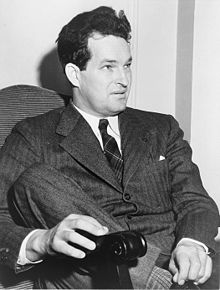Paul Eliot Green
| Paul Eliot Green | |
|---|---|
 |
|
| Born |
March 17, 1894 Lillington, North Carolina, USA |
| Died | May 4, 1981 (aged 87) Chapel Hill, North Carolina, USA |
| Education |
UNC Chapel Hill Campbell University Cornell University |
| Spouse | Elizabeth A. Lay |
| Information | |
| Period | Expressionist |
| Awards | Pulitzer Prize for Drama (1927) |
Paul Eliot Green (March 17, 1894 – May 4, 1981) was an American playwright best known for his depictions of life in North Carolina during the first decades of the twentieth century. He received the Pulitzer Prize for Drama for his 1927 play, In Abraham's Bosom. It was also included in Burns Mantle's The Best Plays of 1926-1927.
Born in Buies Creek, North Carolina, in Harnett County near Lillington, North Carolina Green was educated at Buies Creek Academy (known today as Campbell University). He went on to study at the University of North Carolina at Chapel Hill where he joined The Dialectic and Philanthropic Societies and the Carolina Playmakers. Green also studied at Cornell University.
Green first attracted attention with his 1925 one-act play The No 'Count Boy which was produced by the New York Theatre Club. The next year his full-length play In Abraham's Bosom was produced by the Provincetown Players and received the Pulitzer Prize for Drama. The play was considered remarkable for its depiction of African Americans in the South. Its hero, a man of mixed racial ancestry, finds his idealistic attempts to better the lives of the African Americans around him doomed to failure. With this success, Green quickly was recognized as one of the leading regional voices in the American theatre. His plays were often compared with the folk plays of Irish playwright John Millington Synge. This included his 1926 play, The Last of the Lowries, a fictional account of the Lumbee Indian leader Henry Berry Lowry.
...
Wikipedia
